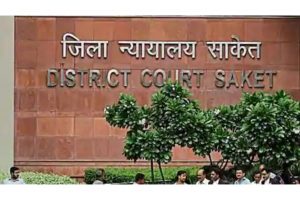South-East District, Saket Courts, New Delhi: Bhanu Pratap Singh, MM (N.I. Act) found the accused guilty of an offence under Section 138 of the Negotiable Instruments Act, where the accused had admitted signatures on the cheque and also failed to make the payment within 15 days of receipt of summons.
Background
Accused took a loan of Rs 2,50,000 from the complainant through cross payee cheque drawn on ICICI Bank in his favour for a period of 6 months and the accused executed acknowledgment and promissory note under his signatures and the said amount carried interest at the rate of 18% p.a. from the date of payment till realization.
Complainant time and again demanded the said loan amount together with interest however, accused showed her inability to repay the said loan amount and always insisted to extend the time for repayment of the said loan amount along with interest.
In the discharge of her part legal liability, the accused issued a cheque for the amount of Rs 2,50,000 under her signature in favour of the complainant leaving the interest part on the said loan amount apart.
As per the instructions of the accused, the complainant presented the above-mentioned cheque for encashment and the same was dishonoured vide bank memo dated 04.12.2014 with remarks ‘Funds Insufficient’.
Thereafter, complainant sent a legal notice under Section 138 NI Act, calling upon the accused to make the payment within 15 days of the receipt of the legal notice as prescribed under Section 138 of the NI Act. Even after the expiry of 15 days stipulated period, the accused did not make the payment, therefore, the accused committed offence under Section 138 of NI Act and the present case was filed by the complainant.
Analysis, Law and Decision
Accused admitted her signatures on the cheque on question in her statement under Sections 251 and 313 CrPC.
In Supreme Court’s decision of Kalamani Tex v. P. Balasubramanian, (2021) 5 SCC 283 , it was held that:
The Statute mandates that once the signature(s) of an accused on the cheque/negotiable instrument are established, then the ‘reverse onus’ clauses become operative. In such a situation, the obligation shifts upon the accused to discharge the presumption imposed upon him.
Court stated that once the accused had admitted her signatures on the cheque in question, presumption under Section 118 and 139 of the NI Act was drawn in favour of the complainant. Hence, it was upon the accused to rebut the presumption under Section 139 NI Act by raising a probable defence in his favour on a scale of preponderance of probabilities.
Accused took the defence in her statement under Section 251 CrPC that she does not know whether she received the legal notice.
The above plea of the accused was not tenable by virtue of the Supreme Court decision in CC Alavi Haji v. Palapetty Muhammed, (2007) 6 SCC 555, wherein it was held that:
“Any drawer who claims that he did not receive the notice sent by post, can, within 15 days of receipt of summons from the court in respect of the complaint u/s. 138 of the Act, make payment of the cheque amount and submit to the court that he had made payment within 15 days of receipt of summons (by receiving a copy of complaint with the summons) and, therefore, the complaint is liable to be rejected. A person who does not pay within 15 days of receipt of the summons from the court along-with the copy of the complaint u/s. 138 of the Act, cannot obviously contend that there was no proper service of notice as required u/s. 138, by ignoring statutory presumption to the contrary u/s. 27 of the General Clauses Act and Section 114 of the Evidence Act”.
Therefore, the accused failed to raise a probable defence in his favour on a scale of preponderance of probabilities and consequently, the presumption under Section 118(a) and 139 of NI Act drawn in favour of complainant had not been rebutted and complainant proved the ingredients of Section 138 NI Act beyond reasonable doubt.
Hence, accused was found guilty for the offence punishable under Section 138 NI Act. [Om Avtar (HUF) v. Shashi Jindal, CC No. 631088 of 2016, decided on 5-10-2021]

